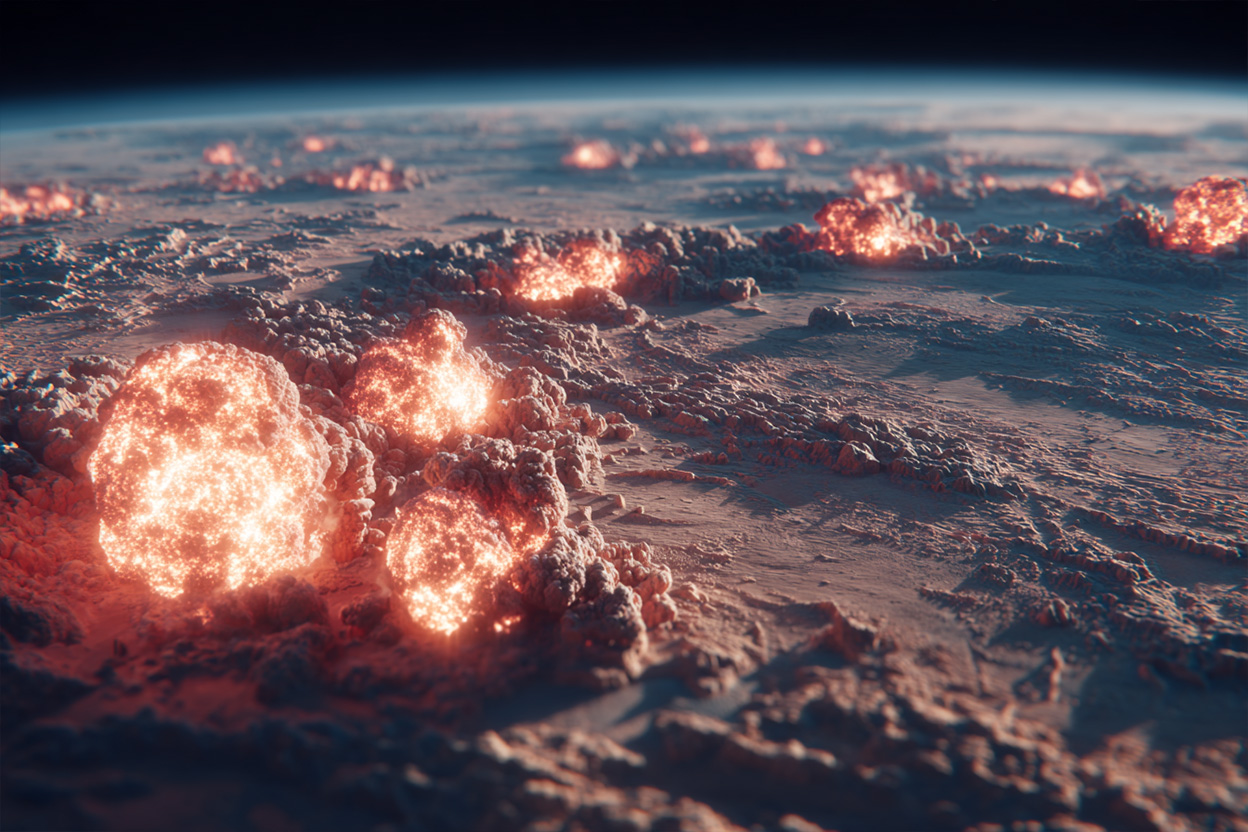
Scientist Claims a Nuclear War "Erased" the Martian Civilization

A Revolutionary Hypothesis That Challenges Everything We Believe About the Red Planet
Dr. John Brandenburg, a physicist specializing in plasma and former collaborator with prestigious institutions such as Sandia National Laboratories and The Aerospace Corporation, has presented one of the most controversial theories in modern astrophysics: Mars was home to an advanced civilization that was completely annihilated by a planetary-scale nuclear war.
This claim, which has divided the global scientific community, is based on detailed analyses of isotopes and chemical elements found in the atmosphere and surface of the red planet. According to Brandenburg, the evidence points to a nuclear catastrophe that literally "erased" all traces of Martian intelligent life.
"The data don't lie," Brandenburg declared at a recent conference. "What we see on Mars cannot be explained solely by natural geological processes. We are looking at the traces of a massive destruction of artificial origin."
The Xenon-129 Enigma
The core of Brandenburg's theory lies in the anomalous presence of xenon-129 in the Martian atmosphere. This isotope, typically associated with nuclear reactions, appears in extraordinarily high concentrations on Mars compared to other bodies in the solar system.
"The proportions of xenon-129 that we observe on Mars are consistent with those we find after atmospheric nuclear tests on Earth," Brandenburg explained in his book "Death on Mars: The Discovery of a Planetary Nuclear Massacre." "This is not a coincidence we can ignore."
In addition to xenon-129, space missions have detected elevated concentrations of uranium and thorium in specific regions such as Cydonia Mensa and Galaxias Chaos. Brandenburg suggests that these areas could have been the epicenters of the detonations that ended the supposed Martian civilization.
Resistance from the Scientific Community
Dr. María Vázquez, an astrobiologist at the Instituto de Astrobiología de Madrid, expressed serious reservations about the theory: "While the isotopic anomalies are real, there are more plausible explanations that don't require invoking lost civilizations. Atmospheric loss due to solar wind and past volcanic activity can explain these phenomena."
Dr. Robert Chen, a planetary geochemistry specialist at NASA, agrees: "We haven't found a single artificial structure or artifact that supports the existence of intelligent life on Mars. The absence of archaeological evidence is a significant obstacle to this hypothesis."
However, Brandenburg maintains his position, arguing that the specific distribution of radioactive elements and the observed isotopic proportions "exceed what we would expect from known natural processes."
Implications for the Fermi Paradox
If Brandenburg's theory were correct, it would have profound ramifications for our understanding of the universe and extraterrestrial life. The possibility that a civilization self-destructed through nuclear war offers a sinister explanation for the Fermi Paradox: why haven't we found evidence of other civilizations if the universe is so vast?
"Mars could be a cosmic warning," Brandenburg reflects. "An example of how advanced civilizations can achieve the capacity for self-destruction before managing to communicate with other worlds."
Search for Additional Evidence
Dr. James Morrison, director of the ESA Mars Exploration Program, although skeptical of the theory, acknowledges its value as a working hypothesis: "Regardless of whether we believe Brandenburg's interpretation, his observations motivate us to search for more evidence. Future missions could include instruments specifically designed to detect radioactive anomalies."
The upcoming Mars sample return mission, scheduled for the 2030s, could provide crucial data to evaluate the theory. More detailed analyses of isotopes in Earth-based laboratories could definitively resolve the origin of the observed anomalies.
A New Perspective on Space Exploration
While the scientific community continues to debate, Brandenburg's theory has generated renewed interest in Martian exploration from an archaeological perspective. Some researchers propose that future missions include specific protocols for searching for evidence of past civilizations.
"Whatever the truth about Mars may be," Dr. Vázquez concludes, "this debate reminds us of the importance of keeping an open mind as we explore our solar system. Each new mission brings us closer to understanding the true history of the red planet."
Brandenburg's theory, though controversial, underscores a disturbing reality: if civilizations can self-destruct, humanity's long-term survival depends on our ability to avoid the mistakes that other worlds may have made before us.